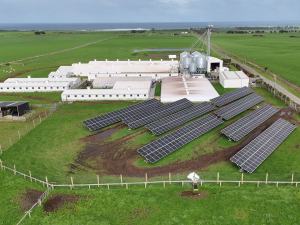Canterbury farmer Sean Molloy joins New Zealand Pork board
Following a recent director election, Canterbury farmer Sean Molloy has been appointed to the New Zealand Pork Industry Board.
 The panels with 200kw capacity have been installed in a paddock at the farm at Oaonui, near Opunake.
The panels with 200kw capacity have been installed in a paddock at the farm at Oaonui, near Opunake.
Installing 400 solar panels at their Taranaki piggery and cropping operation will have significant environmental, financial and animal welfare benefits for the Stanley family.
The panels with 200kw capacity have been installed in a paddock at the farm at Oaonui, near Opunake.
Karl Stanley, who runs the long-established farm with family members, expects the power generated will initially supply about 70 per cent of their daily energy use, with the aim of expanding that to 100% soon.
“We will be feeding the power straight to the piggery rather than selling it to the grid because we get a greater benefit that way,” says Stanley, who estimates the payback time on the investment will be just over four years. The family’s electrician Sinclair Electrical installed the panels.
“Currently our power bills are around $110,000 a year and we expect to cover about $65,000 to $70,000 of that to start with. Most of our power is used during the day, so this makes total sense.”
The indoor piggery has around 500 sows and 5,000 grower pigs at any one time and the major power costs to the business are heating to provide the ideal temperature for their pigs, as well as ventilation, lighting and running electronic equipment such as feed mills.
“The cost savings were the major attraction but it also means less impact on the environment. We all want to reduce our footprint but it has to stack up financially. If it makes sense financially, then we want to do it.”
Having land-based panels in a paddock, like many solar farms, means the land can also still be used for grazing.
“We’ll still be grazing sheep in there and the panels have the additional benefit of providing shelter and shade so the animals can be nice and cool in summer and get under cover if it rains. It’s an ideal use of the land while we’re getting electricity out of it at the same time.”
Previous innovations carried out on the farm have already been recognised with the Stanleys among winners in the 2020 Taranaki Ballance Farm Environment Awards and the Hills Laboratory Agri-Science award.
The farm has not used any commercial fertilisers for decades. Instead, effluent produced in their indoor piggery is piped to land through an irrigation system. The maize, hay and silage produced as a result is sold to other local farms, which means it doesn’t have to be trucked in from further away.
Other measures to reduce energy use include converting all lighting in the business to LED.
“We’ve been doing the baby steps,” says Stanley. “But this is a big leap.”
NZPork is working with farmers to achieve a carbon neutral commercial pig farming sector by 2050.
The comparatively small environmental footprint of commercial pork farmers in New Zealand is a significant attribute of the sector. Pig farming currently contributes just 0.2% of New Zealand’s total Greenhouse Gas agricultural emissions.
According to the latest Fresh Produce Trend Report from United Fresh, 2026 will be a year where fruit and vegetables are shaped by cost pressures, rapid digital adoption, and a renewed focus on wellbeing at home.
The Roar is a highlight of the game hunting calendar in New Zealand, with thousands of hunters set to head for the hills to hunt male stags during March and April.
OPINION: The past few weeks have been tough on farms across the North Island: floods and storms have caused damage and disruption to families and businesses.
European dairy giant Arla Foods celebrated its 25th anniversary as a cross-border, farmer-owned co-operative with a solid half-year result.
The sale of Fonterra’s global consumer and related businesses is expected to be completed within two months.
Fonterra is boosting its butter production capacity to meet growing demand.

OPINION: Meanwhile, red blooded Northland politician Matua Shane Jones has provided one of the most telling quotes of the year…
OPINION: This old mutt has been around for a few years now and it seems these ‘once in 100-year’ weather…